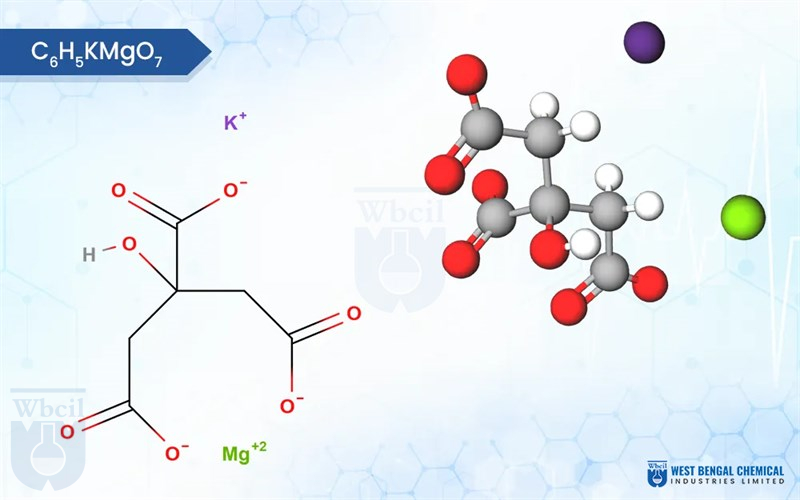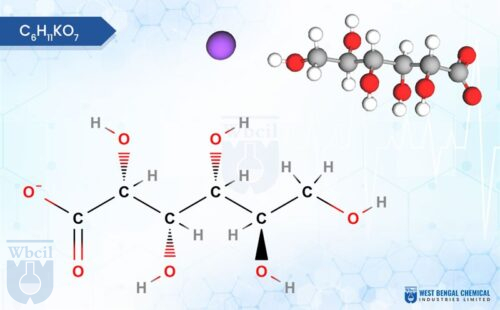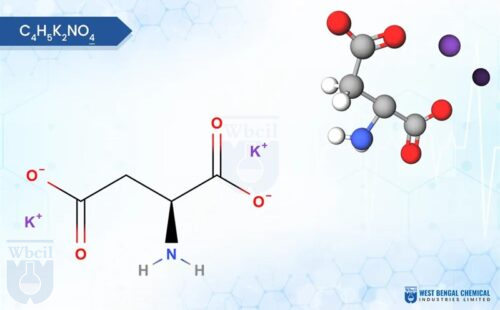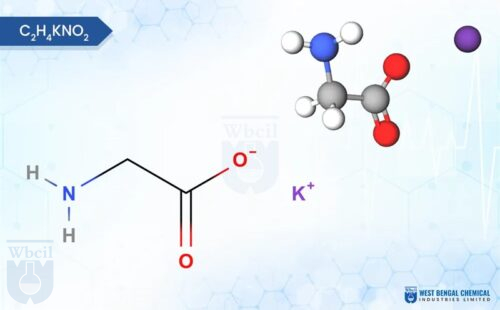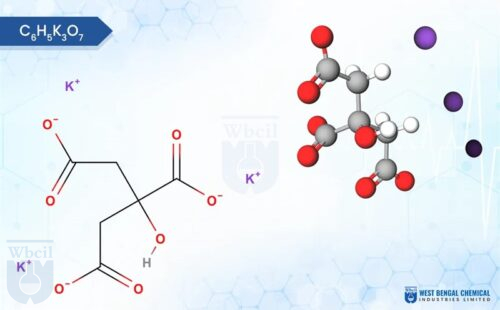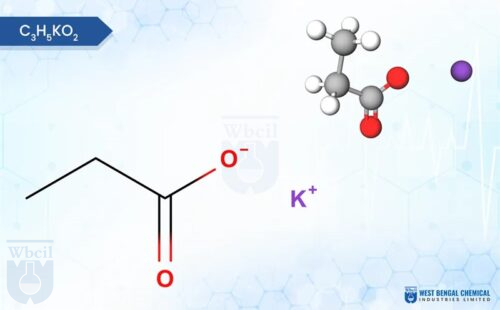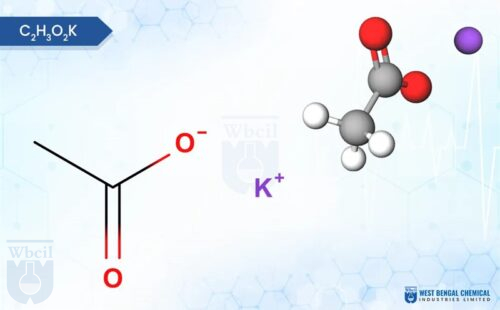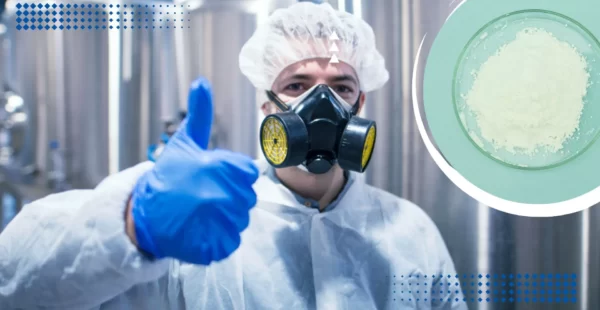-
Product Name:
Potassium Magnesium Citrate
-
Molecular Formula:
C6H5KMgO7
-
Molecular Weight:
252.5 g/mol
-
CAS No.:
137590-34-2
-
HSN Code:
29181590
-
CID Code:
21986909
-
Shelf Life:
3 years - 20°C powder
-
ChemSpider ID
10743304
- USP
- IUPAC Names
- Synonyms
- MSDS
USP of Potassium Magnesium Citrate
- Replenishes both potassium and magnesium.
- Citrate improves absorption and bioavailability.
- Reduces the risk of calcium oxalate stones (Kidney Stone).
- Alkalizes Urine: Helps prevent uric acid stones.
- Benefits muscles, nerves, blood pressure, and bones.
- Less likely to cause digestive upset.
- Available in powder, tablet, or liquid form.
IUPAC Names of Potassium Magnesium Citrate
magnesium;potassium;2-hydroxypropane-1,2,3-tricarboxylate
Synonyms of Potassium Magnesium Citrate
- potassium-magnesium citrate
- magnesium;potassium;2-hydroxypropane-1,2,3-tricarboxylate
- Magnesium potassium 2-hydroxy-1,2,3-propanetricarboxylate (1:1:1)
MSDS of Potassium Magnesium Citrate
Download MSDS PDF- INHALATION: Move exposed person to fresh air. If not breathing, seek immediate medical attention. If breathing is irregular or if respiratory arrest occurs, provide artificial respiration or oxygen by trained personnel and seek medical attention
- INGESTION: Do not induce vomiting unless directed to do so by medical personnel. Never give anything by mouth to an unconscious person. Seek medical attention.
- SKIN CONTACT: Remove contaminated clothing and shoes and immediately flush skin with plenty of water for at least 15 minutes.
- HAZARDOUS COMBUSTION PRODUCTS: Not available FIRE: Not considered a fire hazard.
- EXPLOSION: Not considered an explosion hazard
- FIRE EXTINGUISHING MEDIA: Use fire-extinguishing media appropriate to the surrounding fire
- SPECIAL INFORMATION: In the event of a fire, wear full protective clothing and NIOSH approved self-contained breathing apparatus with full-face piece operated in the pressure demand or other positive pressure mode.
- ENGINEERING CONTROLS: Use process enclosures, local exhaust ventilation, or other engineering controls to keep airborne levels below recommended exposure limits. If user operations generate dust, fume or mist, use ventilation to keep exposure to airborne Contaminants below the exposure limit.
- PERSONAL PROTECTION: Safety glasses, Lab Coat, Dust respirator, be sure to use an approved / certified respirator or equivalent, Gloves
- PERSONAL PROTECTION IN CASE OF A LARGE SPILL: Splash goggles. Full suit. Dust respirator. Boots. Gloves. A self-contained breathing apparatus should be used to avoid inhalation of the product. Suggested protective clothing might not be sufficient; consult a specialist BEFORE handling this product.
- EXPOSURE LIMITS: Consult local authorities for acceptable exposure limits.
- Appearance Form: Free flowing powder
- Color: White
- Odour: Odourless
- Chemical Formula: C6H5KMgO7
- Molecular weight: 252.5 g/mol

Description of Potassium Magnesium Citrate
Potassium magnesium citrate is a white to off-white, odorless, crystalline powder or granules. It is highly hygroscopic, readily absorbing moisture from the atmosphere. This property is attributed to the presence of citrate ions, which have a strong affinity for water molecules. Chemically, it is a tribasic salt with the formula K4Mg(C6H5O7)2·xH2O, where x represents the variable number of water molecules of hydration. The compound is a combination of potassium citrate and magnesium citrate, offering a balanced source of these essential minerals. As a water-soluble salt, it readily dissolves in aqueous solutions, forming a clear, colorless solution. As a leading API manufacturer, WBCIL prioritizes strict CGMP and ISO quality control measures throughout the production process. The prolonged experience from 1962 ensures consistent potency, purity, and safety in every dose of WBCIL’s Potassium magnesium citrate.
Application of Potassium Magnesium Citrate
Pharmaceutical Industry:
- Kidney Stone Prevention: Potassium magnesium citrate is widely used in the formulation of medications designed to prevent the formation of kidney stones, particularly calcium oxalate and uric acid stones. The citrate component helps alkalize the urine, reducing stone formation risk and supporting overall kidney health.
- Electrolyte Replenishment: It is included in supplements to address deficiencies in potassium and magnesium, which are vital for muscle function, nerve transmission, and cardiovascular health. This makes it essential in medications for treating conditions like hypokalemia (low potassium) and hypomagnesemia (low magnesium).
Nutraceutical Industry:
- Bone and Muscle Health: In the nutraceutical sector, potassium magnesium citrate is formulated into dietary supplements to improve bone density, support muscle function, and regulate blood pressure. Its role in promoting electrolyte balance and preventing cramping makes it popular among athletes and individuals with active lifestyles.
- Blood Pressure Regulation: Due to its dual role in potassium and magnesium replenishment, the compound helps maintain normal blood pressure levels, which is crucial for heart health. As a result, it is often marketed as part of heart health supplements.
Healthcare and Wellness Industry:
- Urinary Health Products: Potassium magnesium citrate is included in products aimed at improving urinary health by alkalizing urine. This helps prevent uric acid stone formation and supports overall bladder and kidney function, making it a common ingredient in wellness supplements targeting individuals at risk for urinary tract issues.
- Bone and Cardiovascular Support: Available in various forms (powder, tablet, liquid), it is used in wellness products designed to support bone health, cardiovascular function, and nerve health, particularly in aging populations or those at risk for osteoporosis or cardiovascular disease.
Sports and Fitness Industry:
Electrolyte Replacement Supplements: Potassium magnesium citrate is commonly used in sports supplements to replenish electrolytes lost during intense physical activity. Its high bioavailability ensures rapid absorption, aiding in muscle recovery, reducing cramping, and preventing dehydration. This makes it a valuable component in post-workout recovery products.
Functional Foods and Beverages:
- Fortified Foods: The compound is sometimes added to functional foods and beverages aimed at promoting general wellness, especially for individuals with electrolyte imbalances or those requiring enhanced mineral intake for muscle and bone health.
- Digestive-Friendly Formulations: Since potassium magnesium citrate is less likely to cause digestive upset compared to other supplements, it is used in food products and beverages designed for individuals with sensitive stomachs or digestive concerns, promoting easier mineral intake without discomfort.


